Elderly Chinese want a second chance at love

At a matchmaking corner in Guangzhou's Tianhe Park, 65-year-old Zhang Damao is still unable to find a suitable partner after meeting numerous potential dates over the past year.
"I guess neither of us caught the other's eye. Either she'd think I'm not good enough, or I'd think we're not a good match," Zhang let out a self-deprecating laugh, but did not seem too disappointed.
Zhang works in the traditional Chinese medicine industry and refers to himself as "Physician Mao". He divorced his wife 20 years ago because their "personalities clashed" and has since remained single. Last year, he moved from Beijing to Guangzhou and decided to permanently reside in this southern city. Soon after, he solemnly hung up a poster with his personal information at the matchmaking corner, hoping to find a 60-year-old down-to-earth lady to settle down with.
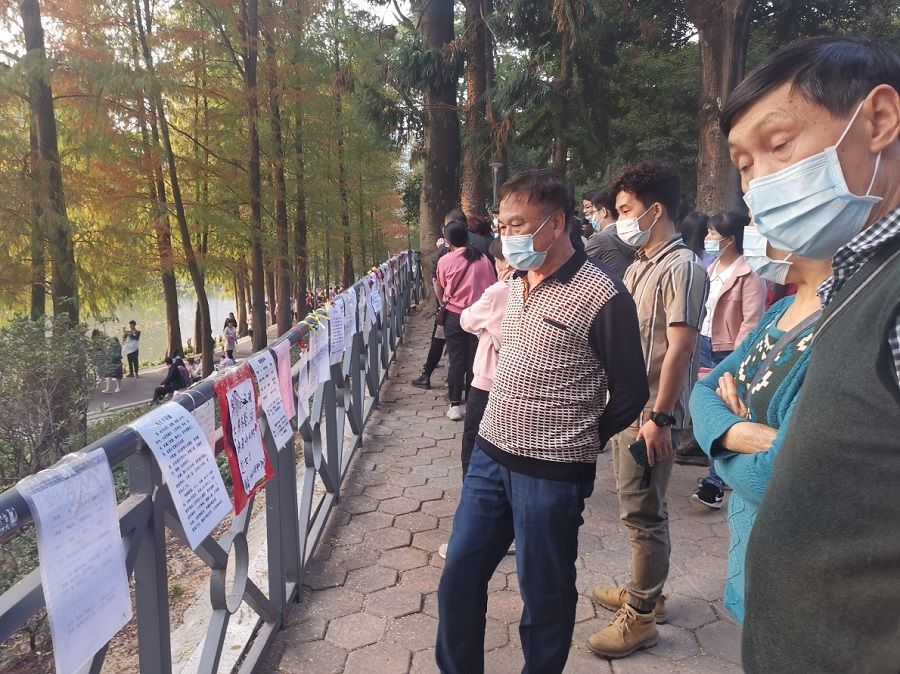
This matchmaking corner in Tianhe Park is a popular public matchmaking spot in Guangzhou. Every weekend, people from all walks of life would crowd the area. While most of them gather there in search of a mate for their children, some, like Zhang, are there to post their own particulars on posters hung up in rows at the matchmaking corner.
In his personal introduction, Zhang openly states that he has no house, car or savings. However, he is mild-tempered, loves to cook, has good medical skills, and can take care of his partner's health. Peppered with exclamation marks, his blurb tellls would-be partners that he can guarantee them a healthy and fulfilling life.
...after most of his dates confirmed his financial status, they quickly and "materialistically" ended contact.
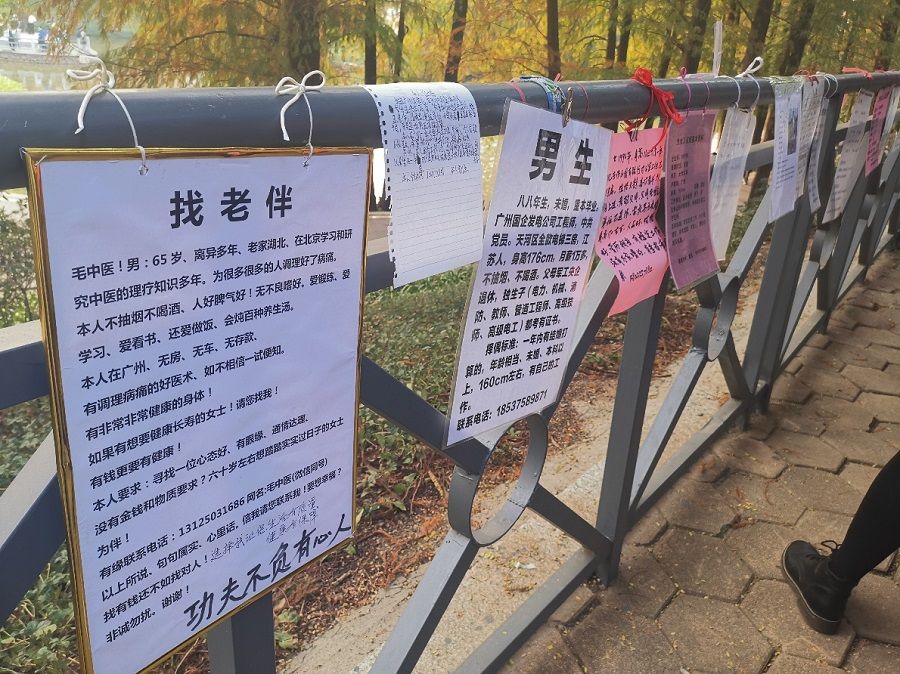
But his honesty about his financial situation often invites suspicion. "I met a lady yesterday and she kept asking if I was telling the truth," Zhang lamented. He later found her too dull and did not bother contacting her again.
"She kept her guard up the whole time," he said.
Material factors more important when the elderly seek a partner
Being direct and free of pretence may be the characteristics of middle-aged and elderly people like Zhang when it comes to finding a partner. They do not like to beat about the bush or waste time. Hence, after most of his dates confirmed his financial status, they quickly and "materialistically" ended contact.
Looking somewhat defeated, Zhang said, "Material factors are more important when the elderly find a partner."
Over the years, he has taken part in numerous matchmaking events, even travelling to Beijing for a matchmaking TV programme. He said that over 90% of the women he has dated enquired if he had a house and a car. He sighed, "Those who don't talk about money are one in a million."
While he seems to understand their financial criteria, he is also baffled. He asked, "Some of them already own a few properties and yet they still demand that the guy must own a property himself. Why do they need so many properties?"
But at the same time, when he talks about what he looks for in an ideal partner, he also hopes that his partner would be independent and not be overly reliant on him because "if she doesn't lack money, she won't covet mine".
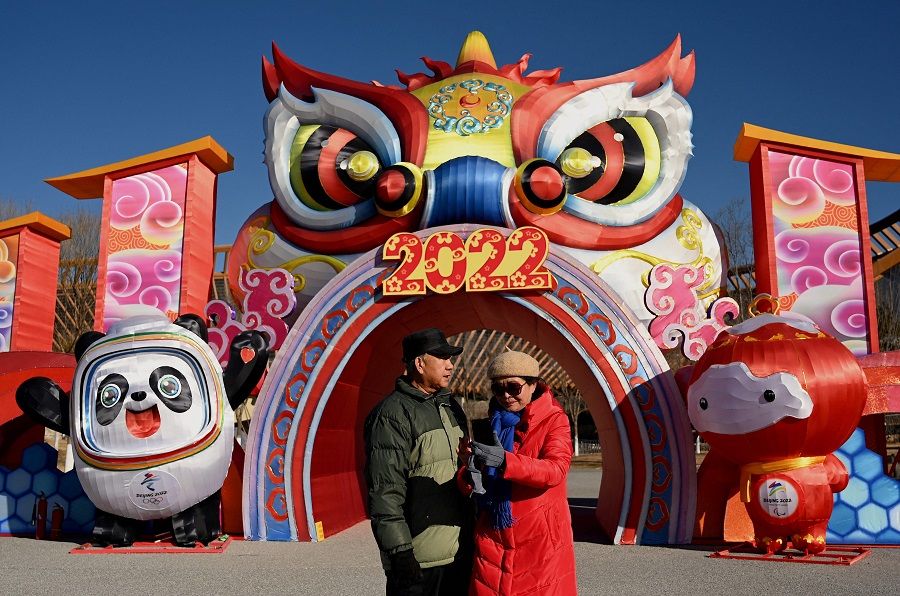
67-year-old retiree Mr Zhao, who also put up his personal information at the matchmaking corner, agrees that it is difficult for the middle-aged and elderly to find a partner. Zhao has a better financial situation and claims to own two properties, not to mention a generous pension. Over the past few months, he has met a few potential dates at the park, but none of his dates turned into a relationship.
Zhao explained, "There was either no physical attraction, or we just lacked common topics."
Zhao was a company employee before retirement. After his wife passed away ten years ago, his open-minded daughter encouraged him to find a partner. This year, he finally mustered up enough courage to try matchmaking.
He is looking for an understanding woman who is easy to communicate and get along with, and he will not compromise and settle for just anyone. Until now, he has been unsuccessful.
Ms Ye, a matchmaker who works with middle-aged and elderly clients at a Guangzhou matchmaking agency (广州爱桥联谊公司), told Zaobao that there is high demand for matchmaking among the middle-aged and elderly, but the challenges are huge as well.
To ignore such prejudice and take a step forward, as well as to win the support of the children are two major factors affecting the elderly in their search for love.
For instance, compared to the younger generation, they are more particular that their partners should be of certain status. They also have more issues to consider, such as their individual assets, social security and medical insurance, educational background, socioeconomic status, as well as their children.
Ye pointed out that although the situation has improved, a feudal mentality still exists in Chinese society and some people are against the elderly getting remarried; those aged between 70 and 80 were also more concerned about people gossiping behind their backs. To ignore such prejudice and take a step forward, as well as to win the support of the children are two major factors affecting the elderly in their search for love.

Children are less worried with a changed mentality towards asset distribution
She also pointed out that in the past, the key reason why many young people strongly objected to their elderly parent's remarriage was because of asset distribution. But the situation has improved now, as people become more aware and willing to respect the emotional needs of the elderly.
At the same time, fewer young couples live with their parents after marriage, which means that it would be good for the single elderly to remarry so that they will have someone to take care of them and vice versa.
Also, many elderly people have already transferred the ownership of the house and other assets to their children prior to their remarriage, while others are living together without registering their marriage, which means that their children need not worry about asset distribution.
Matchmaking television programmes gaining popularity
As China becomes an ageing society with an ever-growing ageing population - China's seventh national population census states that persons aged 60 and above account for 18.70% of the population - an increasing number of people from this age group have a greater desire to remarry and find a life partner.
Industry media company AgeClub, which focuses on business innovation and incubation services through venture capital for businesses in the senior services industry, previously estimated that there are at least 50 million middle-aged and elderly users in China with real needs in love and marriage.
...some TV stations have also started running dating shows just for the middle-aged and elderly, while there are also livestream dating rooms by marriage and socialising platforms.
Compared to young people with their richer social resources in terms of love and marriage, previously there was a relative lack of channels for seniors to seek partners. However, in recent years, there has been a gradual increase in matchmaking channels specially catering to the middle-aged and elderly.
Besides matchmaking corners in parks and dating events organised by marriage agencies, some TV stations have also started running dating shows just for the middle-aged and elderly, while there are also livestream dating rooms by marriage and socialising platforms.
This year, dating shows targeted at the middle-aged and elderly have been very popular, such as Hubei TV's Love Blooms (桃花朵朵开), Jilin TV's Love Never Comes Late (缘来不晚), Liaoning TV's Love's Choice (爱的选择), and Heilongjiang TV's Loving (相亲相爱), with viewers attracted by how the elderly participants exchange barbs and frank, razor-sharp views, and are not coy in honestly declaring their love.
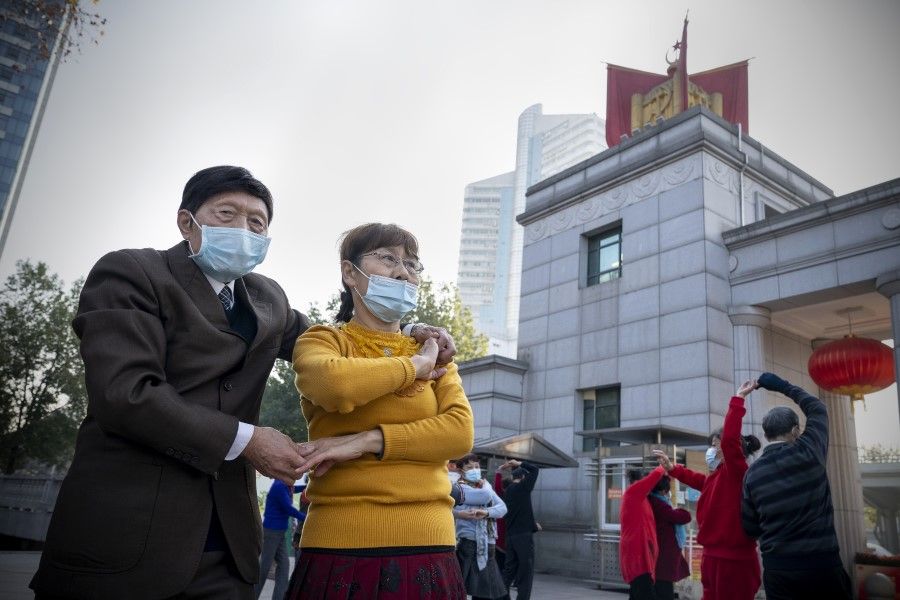
Zhang, who is currently seeking a partner at the matchmaking corner in Tianhe Park in Guangzhou, took part in a dating show with a Beijing TV station in May. Soon after he went on stage, he was rejected by the female guest, who said he was not her type.
Zhang self-deprecatingly said that going on the show was like ordering items from a menu, and he was like celery and bitter gourd, with few takers. The female guest later revealed off stage that one reason she rejected him was because he had no house, adding that she preferred to shuttle between her own place and her partner's.
Many viewers get a kick out of seeing this sort of straight dealing in the context of dating and socialising. And even though he did not get matched up, Zhang approves of such shows. He told Zaobao that it is an improvement to have society paying attention to the emotional needs of the middle-aged and elderly, and to help the elderly who have lost their spouses with the tough issue of getting remarried.
Better idea of what they want, bolder in expressing themselves
Zhou Xiaopu, a professor with the School of Journalism and Communication at Renmin University of China, told Zaobao that in the internet era, young people have moved away from TV, while the elderly prefer to watch TV out of habit, which is one of the reasons why dating shows for the elderly are on the rise.
Also, as most of them have been married before and have a clear need to form another family, they have a clearer idea of what they want in their other half and are bolder in expressing themselves, which gives such shows a larger market and a sense of novelty.
Some marriage agencies have shifted their focus to serving the middle-aged and elderly. Over the past few years, Ms Ye's marriage agency has organised regular social activities for the middle-aged and elderly, providing opportunities for them to get to know one another better through tea-drinking, singing, and games sessions.
Ms Ye says they have brought many middle-aged and elderly people together. Some elderly have got married again, while others choose to live together without getting married, in order to maintain their individual rights.
...the elderly are more financially independent and more aware of their emotional needs, and do not put their children's views first.
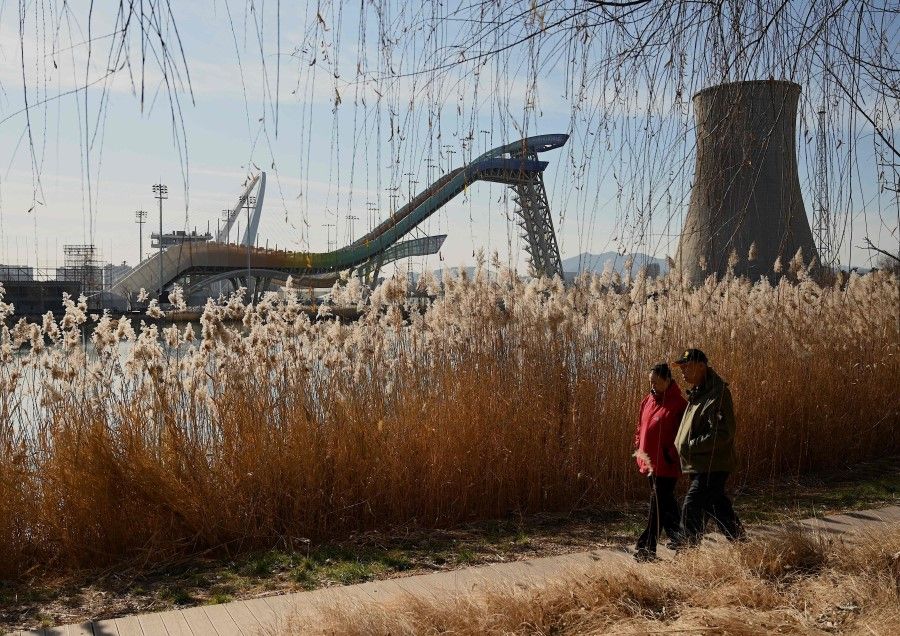
Prof Zhou said the increased demand for dating among the middle-aged and elderly reflects a real change in the marriage industry, with the emotional needs of various groups starting to surface and getting attention.
Previously, only a minority of elderly who had lost their spouses wanted to get married again, but with China's rising divorce rates, many initiated by women, there is a demand for marriage among more and more middle-aged and elderly people, stimulating the growth of the vast marriage industry for this group.
Prof Zhou also noted that family relationships among Chinese now are more equal than before: on the one hand, young people are more accepting of the elderly choosing to remarry, while on the other, the elderly are more financially independent and more aware of their emotional needs, and do not put their children's views first. All these are signs of social advancement.
Emotional needs have to be given attention
The issue of elderly marriage will become more pressing in the future. Ms Ye feels that in comparison to the huge market demand, the emotional needs of the middle-aged and elderly are not given enough attention. Even though many people are taking the brave step of standing in front of a camera or a crowd, and social acceptance of remarriage among the elderly is growing, many elderly have not changed their mindset and are unwilling to acknowledge their emotional needs, or think too much about the feelings of those around them and end up spending their twilight years alone.
Society cannot just pay lip service and empty words to the emotional needs of this group, but should address it and provide support...- Zhou Xiaopu, a professor with the School of Journalism and Communication at Renmin University of China
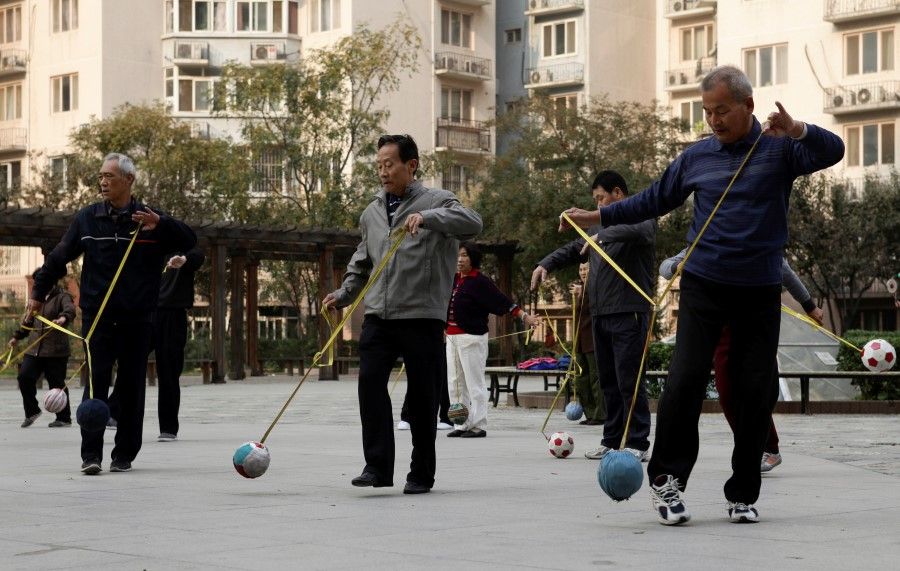
She feels society needs to take note of this issue, starting with each individual encouraging the elderly around them to seek happiness, and providing them with more care and consideration, while being aware of the risk of love scams to prevent the elderly from losing out in terms of relationships and money while making friends.
Prof Zhou said Chinese culture emphasises family; retired elderly are more in need of the support of a partner, and it is a common social issue that it is difficult for the middle-aged or elderly to find a partner in their old age. Society cannot just pay lip service and empty words to the emotional needs of this group, but should address it and provide support, and think about how to really help the middle-aged and elderly to find someone suitable, to make their twilight years better.
Related: China's rural elderly: The disappearing keepers of tradition | Chinese single women ponder love, marriage and freedom | 'Leftover men' in the Chinese countryside and 'leftover women' in Chinese cities | Love in the cloud: China's emerging livestream matchmaking industry | No bride price, no marriage in China
